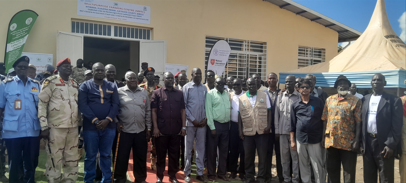The United Nations Food and Agriculture Organization (UN FAO), with funding from the World Bank, has handed over two farmers’ centers and two stores to the communities in Jur River and Wau counties in Western Bahr el Ghazal State.
The first farmers’ center was handed over to the community in Wau County’s Besilia Payam on Tuesday, while the second center in Kuajiena Payam in Jur River County was handed over on Wednesday. The stores are located in Ngisa in Wau County and Majak Alel in Jur River County, respectively.
The new infrastructure was developed under the World Bank-funded Resilient Agricultural Livelihoods Project (RALP) and implemented by the FAO. The project aims to boost agricultural productivity and resilience in the country.
The Multipurpose Community Farmer Centers are designed as learning and innovation hubs for farmers to build modern farming capacities to become resilient. Each facility is fenced and equipped with demonstration plots for training in good agricultural practices, water yards for irrigation and climate-smart agriculture demonstrations, and value addition equipment such as maize mills and sorghum threshers.
“These assets are the result of the government’s commitment to strengthening the capacity of our farmers,” said Lemi Wani, the Director General for Community and Rural Development at the Ministry of Agriculture and Food Security. “With the support of the World Bank and FAO, we are taking concrete steps to transform agriculture into a driver of economic growth and food security.”
The project is being implemented in 14 counties across nine states in South Sudan, including Aweil East, Aweil South, and Western Bahr el Ghazal State.
Speaking during the handover ceremony in Kuajiena Payam in Jur River County on Wednesday, FAO Representative in South Sudan, Dr. Maurice Nyombe, said the project’s exit strategy is to enhance the capabilities of the management and operational committees at the center.
“As a project exit strategy, there has been a strong emphasis on enhancing the capacities of the management and operational committees at the center. Furthermore, a comprehensive business plan has been developed,” he said. “Important to note is that these centers would still need support as we nature it to be more independent and able to carry out its functions fully. In view of this, FAO remains open to address areas of improvement and support required, for example, the construction of outside pit latrines, outside kitchen, improved water harvesting facilities, and any defects on the structures.”
“FAO remains ready to work with the state government and the people of Jur River County to ensure that these facilities deliver the much-needed services to our communities,” Dr. Nyombe added.
In Besilia Payam, Wau County, Edward Gabriel, a farmer’s representative, welcomed the new center.
“We will not sleep in Besilia today due to happiness because we have received our priority, and we can now feed the whole of Wau, and we will provide our neighboring states with fruits,” he said. “Our only problem is a lack of tools, and we urge the state agriculture ministry to support us.”
Speaking on behalf of the farmers, Jur River County Executive Director, Paquale Madut, urged the state government to provide security so that people can carry out farming activities.
“As the citizens of the county, we have come to understand today that we have a government that can provide us with services because of this facility,” he said. “What we need is peace, as said by one of the farmers before. Peace can bring development, including good roads and agricultural production.”
On his part, Governor Emmanuel Primo Okello urged the people of Jur River County to use the center beneficially.
“This a national program to fight hunger in the country and this is why it important for us to come and join you on how we can learn modern farming. We need all the skills we can learn from this center to be put into practice in our farms,” he said. “We also come here to bring you messages of peace, because without peace and stability, we would not be here. Also, this is the implementation of taking towns to rural areas in our state.”
The Resilient Agricultural Livelihood Project, launched in June 2021, is a five-year initiative with an initial investment of $ 62.5 million and an additional $ 30.5 million in financing.




